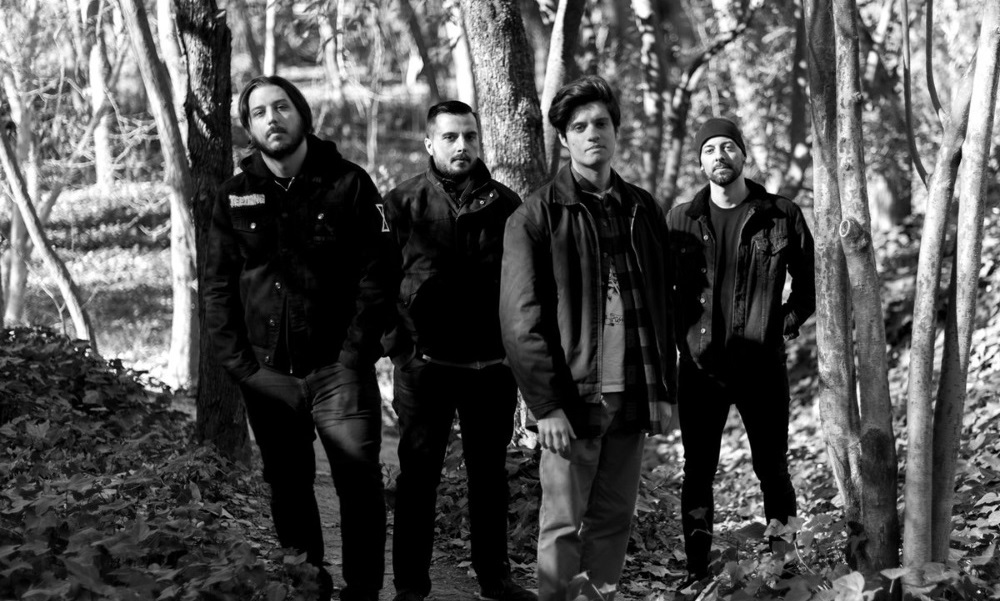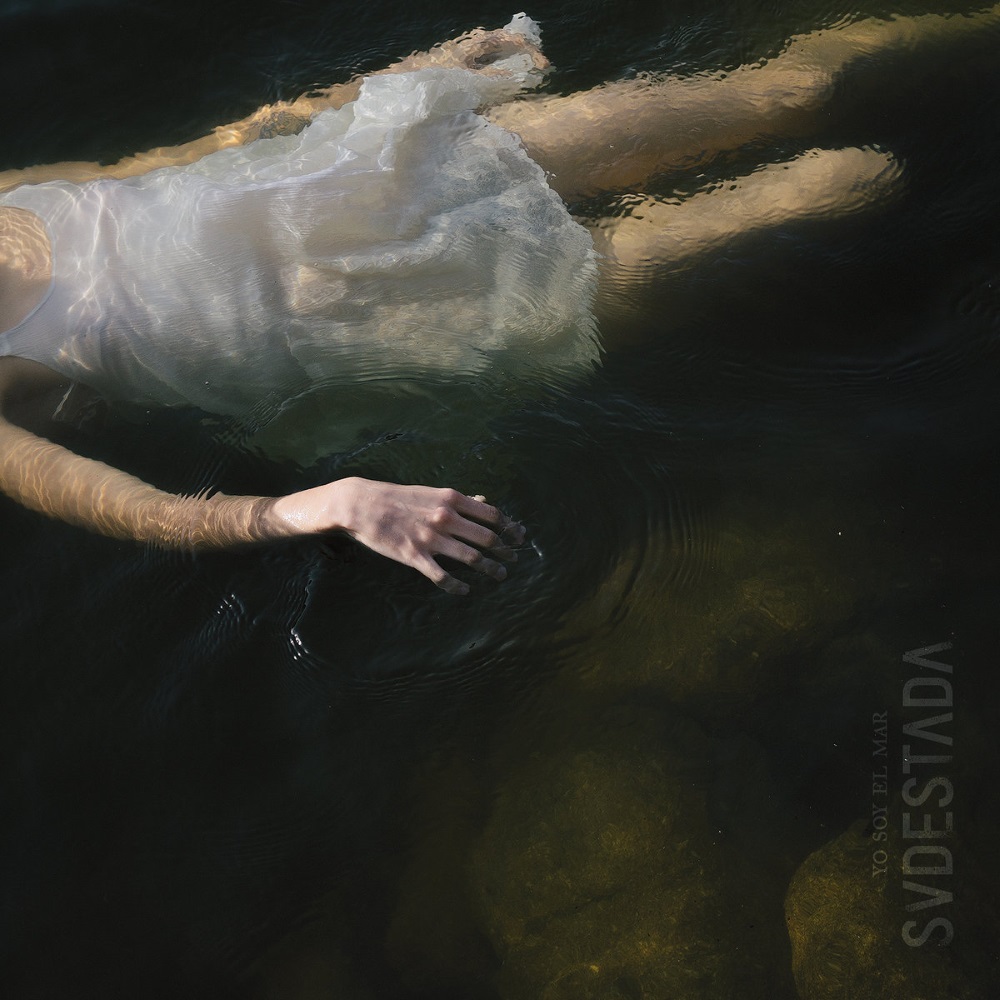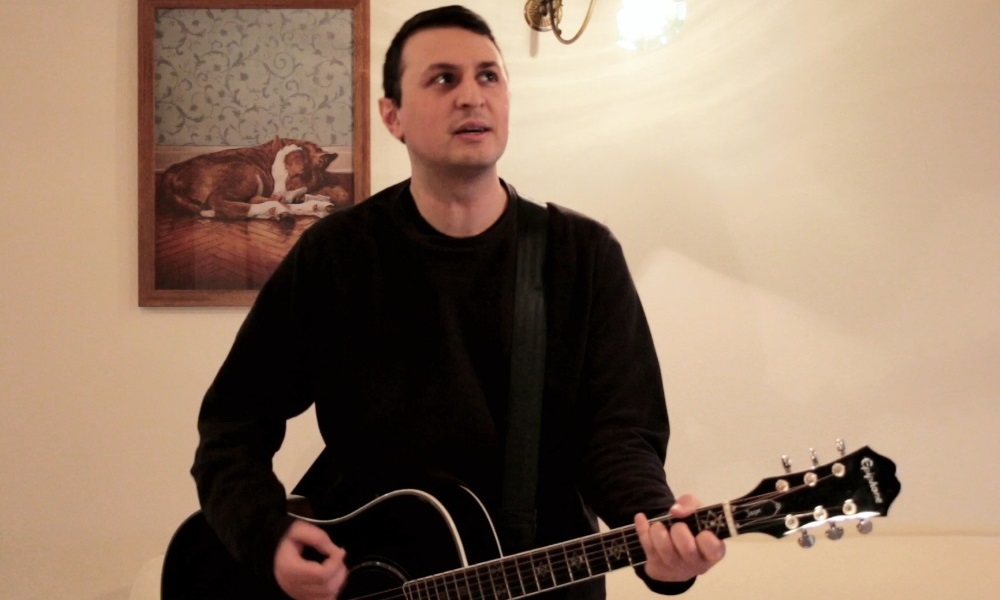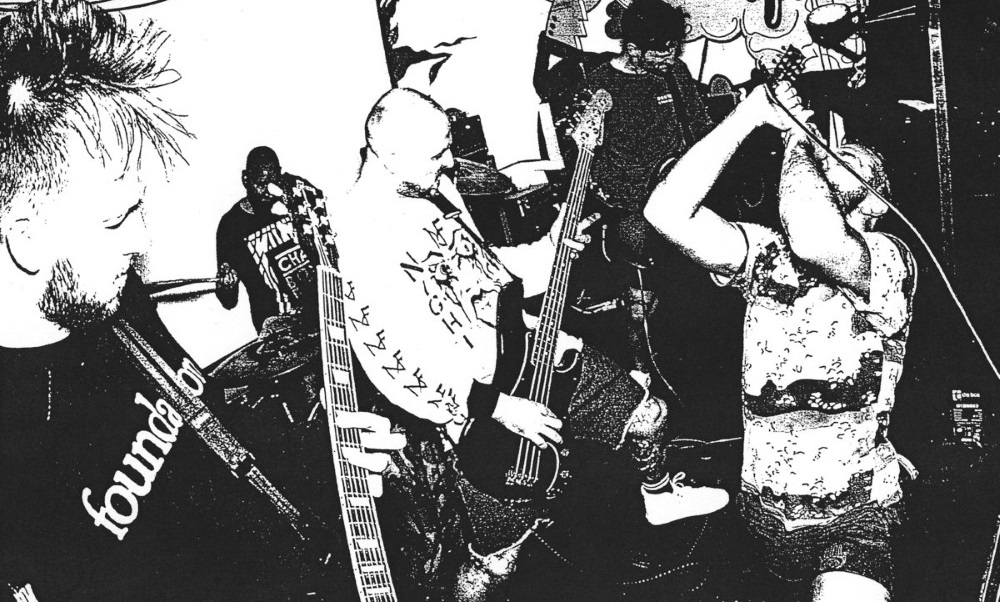Traveling from the fiercest crust-punk, across the amplitude of post-hardcore, and right into the dense and dark landscapes of post-metal, the newest offering from Madrid based SUDESTADA is a real treat for fans of the genre. After a year touring around Spain, this ambitious quartet have released their first album with the help of the labels The Braves Records, Odio Sonoro and Kill Vinyl. Today, we’re pleased to give you a full tour of each and every track and its meaning, both in English and Spanish. Buen provecho!
“Yo soy el mar” is an intense, exploratory affair, with lots of energy being heavily deployed at most of the compositions to fit right into the ever-looming dark atmopshere. With an interesting concepts around naure and human emotions, it proves the band to be interesting storytellers and engaging architects. Spiced up with a great cover art, this cohesive, creative, and multi-faceted offering ignites the spark of bleak wizardry that delivers an overall compelling experience.
Yo soy el mar (I Am The Sea), the title of the album, is taken from the lyrics of a song that was finally discarded, which said something like: “in the middle of the storm you decided to abandon, let yourself be carried away by the tide, but I stayed to fight against the wind, because I am the sea “(I do not remember the exact phrase).
Throughout the album, there are metaphorical allusions to elements and forces of nature to represent some of the most intense human emotions. The very name of the band, Sudestada, refers to the cold winds that cross the region of the Río de la Plata, in Argentina, announcing the Winter.
Produced by Iván Ferro at Kollapse Studio (Lugo – Galicia) and mastered by the almighty Brad Boatright at AUDIOSIEGE (Portland – Oregon), “Yo soy el mar” is available via The Braves Records, Odio Sonoro, and Kill Vinyl Records.
Take the wailing riffs and energetic drumming of Converge, add Spanish lyrics with a more constricted vocal delivery and you’ve basically got Sudestada. Early tracks like “Bengalas” and “Soflamas” sport some serious hooks that sound like they were written by Ballou himself. And far from just a straightforward D-beat fest, Yo Soy El Mar traverses a number of changes in pacing and mood to keep things interesting. MetalTrenches.com
SUDESTADA is: Mario C. Vaises (Khmer), Peter Lopez (Waylon Jones), Jorge Urosa and Fernando Lamattina (This Thing Called Life)
Continued below…
Ostro:
This is an intro of a few seconds that, like all the album interludes, is named after a type of wind. In this case, Ostro is the Italian name that receives a southern wind that blows in the Mediterranean.
Esta es una intro de unos pocos segundos que, como todos los interludios del disco, tiene nombre de viento. En este caso, Ostro es el nombre italiano que recibe un viento del sur que sopla en el Mediterráneo.
Bengalas (Flares):
Life does not usually give us a truce. We are always a few steps behind the circumstances and when we finally stabilize, everything revolves around us and we are forced to start over. It is a daily struggle against the world, from the first hour: against adversity, those that hurt us and betray us, the worries and painful memories that we can not leave behind … and all with the certainty that in the end we will lose, that nothing makes too much sense. Death will take us away and our passage through the world will be inconsequential. In this way, all we can do is “throw flares” in the dark, creating, composing, writing, improvising … making art with our miseries and winning at least some battles to fate.
La vida no suele darnos tregua. Vamos siempre unos pasos por detrás de las circunstancias y, cuando por fin conseguimos estabilizarnos, todo vuelve a girar a nuestro alrededor y nos vemos obligados empezar de nuevo. Es una lucha diaria contra el mundo, desde primera hora: contra la adversidad, los que nos hieren y nos traicionan, las preocupaciones y los recuerdos dolorosos que no conseguimos dejar atrás… y todo ello con la certeza de que al final perderemos, que nada tiene demasiado sentido; la muerte se nos llevará y nuestro paso por el mundo será intrascendente. Así las cosas, lo único que podemos hacer es ir “lanzando bengalas” en la oscuridad, creando, componiendo, escribiendo, improvisando… haciendo arte con nuestras miserias y ganándole al menos algunas batallas al destino.
Soflamas (Deceits):
We’re surrounded by people in our social and familiar circles that pledge to understand the solution to all of our problems. Granting us free lectures in the matter because they have read a few posts in places like blogs, websites or their social network accounts. What we don’t realise sometimes is the totalitarian stink emanating from these written phrases and dead ideologies. I found out these people need to believe in something without questioning its own nature, avoiding the headaches provoked by reason and the mental analysis they could produce, They don’t even put into doubt their own opinions. They need saviors who can put up with hard work for them, a miraculous solution for problems without one. That’s why religions still exist, that’s why atrocious ideologies still get followers… Fanatism won’t reason, it just imposes its principles… Maybe today just using words, but maybe the future is filled with blood and fire.
Estamos rodeados de predicadores: familiares, amigos y desconocidos que nos sermonean a diario en las redes sociales, en el trabajo… Iluminados que conocen la solución a todos los problemas porque se han leído cuatro posts y dos panfletos, sin darse cuenta del tufo totalitario que despiden sus frases hechas y sus ideologías muertas. Me di cuenta de que todos ellos necesitan creer en algo ciegamente, evitarse el dolor de cabeza que supone razonar, analizar y poner en cuestión sus propias opiniones. Necesitan salvadores que hagan el trabajo duro por ellos, soluciones milagrosas para problemas sin solución. Por eso las religiones siguen existiendo miles de años después, por eso las ideologías más atroces siguen captando adeptos, porque el fanatismo no razona, solo impone su doctrina, hoy con sermones, pero mañana a sangre y fuego.
Zozobra (Foul Wind):
There are times that after a stormy period in our lives, when it seems that we have finally managed to get afloat and stabilize again, our past returns to shake us, threatening to drag us to the bottom once more. Nostalgia is always tempting and what we know is comfortable, but that is when we must remember how much we suffer, what it cost us to get out of there and that there are paths that we have already travelled and we know that they lead nowhere. We must draw a line on the ground which people who don’t deserve to be by our side, won’t cross.
Hay veces que tras un período tormentoso de nuestras vidas, cuando parece que por fin hemos conseguido salir de nuevo a flote y estabilizarnos, nuestro pasado regresa para sacudirnos y amenaza con arrastrarnos al fondo una vez más. La nostalgia siempre es tentadora y lo que conocemos nos resulta cómodo, pero es entonces cuando debemos recordar cuánto sufrimos, lo que nos costó salir de ahí y que hay caminos que ya recorrimos y sabemos que no llevan a ningún sitio. Debemos dibujar una línea en el suelo que nadie que no merezca estar a nuestro lado pueda traspasar.
Renacido (Reborn):
I have always been surprised by the ability of people to recover, how after having reached the bottom, one can recover and smile again. They say that time heals everything, and it’s true. No matter how much you crawl on the floor in pain, convinced that you won’t get out of that, you suddenly wake up one day and your wounds are closed. You have been reborn (once again).
Siempre me ha sorprendido la capacidad de recuperación de las personas, cómo después de haber tocado fondo, uno puede llegar a recuperarse y volver a sonreir. Dicen que el tiempo lo cura todo, y es verdad. No importa cuánto te arrastres por el suelo de dolor, convencido de que de esa no sales; un día te levantas y tus heridas están cerradas. Has renacido (una vez más).
Siroco:
Interlude with wind name of the typical southeastern Mediterranean.
Interludio con nombre de viento del sureste típico del Mediterráneo.
Credo (Creed):
Everything collapses around us, nothing goes as planned and after so many disappointments we are left with few things to believe in. Let’s stop dreaming of other lives that are not ours, of always pursuing the future. If the world burns and we can’t do anything about it, at least try to enjoy the show, embrace the present as it comes and do something worthy with it. Let’s make sense of a life that does not really have it, improvise a little without worrying about the end and never give in to speculations, impossible dreams or an idiotic optimism.
Todo se derrumba a nuestro alrededor, nada ha salido como habíamos planeado y tras tantas decepciones nos van quedando pocas cosas en las que poder creer. Dejemos de soñar con otras vidas que no son la nuestra, de ir persiguiendo siempre al futuro. Si el mundo arde y no podemos remediarlo, al menos disfrutemos del espectáculo, tomemos el presente tal cual nos llega y hagamos algo digno con él. Démosle sentido a una vida que realmente no lo tiene, improvisemos un poco sin preocuparnos del final y jamás cedamos a las especulaciones, los sueños imposibles o al optimismo idiota.
Pompeya (Pompeii):
Pompeii is the image of a society buried under meters of earth and ashes, a dead and silent society … How many times have I seen beggars in the subway, like invisible figures to the rest . I think that many of those people who look down or keep their eyes on their phone screens are the same ones who then lecture others on social networks, outraged with so much injustice, preaching solidarity from behind the keyboard. People that when the time comes to demonstrate that empathy they preach about, they simply look the other way.
Pompeya es la imagen de una sociedad enterrada bajo metros de tierra y ceniza, una sociedad muerta y callada… Cuántas veces habré visto en el metro a gente mendigando, realmente necesitada, invisibles para el resto del vagón. Pienso que muchas de esas personas que bajan la vista o miran el móvil son las mismas que luego aleccionan a los demás en las redes sociales, indignados con tanta injusticia, predicando la solidaridad desde detrás de un teclado. Personas que cuando llega el momento de demostrar esa empatía que predican, simplemente miran para otro lado.
Barlovento (Windward):
The sailors call Windward to the place where the wind comes. In this issue, the hurricane winds and storms were unleashed by a person with whom I lived in a toxic and endless relationship that almost ended me. It was the prototype of a person who makes others responsible for their own failures and the conflicts they cause, who are charming and attentive among strangers, whom they want to dazzle, but crush those who are closest to them and who give them the most love. And yet, although not a day goes by without remembering how much he despises you, he does not let you go. When I finally got out of that and could look back with a fresh perspective, I realized that there was nothing that deserved so much suffering.
Los marinos llaman barlovento al lugar de donde llega el viento. En este tema, los vientos huracanados y las tormentas los desataba una persona con la que conviví en una relación tóxica e interminable que casi acaba conmigo. Era el prototipo de persona que responsabiliza a los demás de sus propios fracasos y los conflictos que provoca, que se muestra encantadora y atenta entre desconocidos, a los que quiere deslumbrar, pero machaca a aquellos que tiene más cerca y que más amor le dan. Y sin embargo, aunque no pasa un día sin recordarte cuánto te desprecia, no te deja marchar. Cuando por fin conseguí salir de aquello y pude mirar atrás con perspectiva, me di cuenta de que allí no había nada que mereciese tanto sufrimiento.
Lebeche:
Lebeche is the outro of the album, whose name refers to a wind blowing in Spain from the southwest.
Lebeche es la outro del disco, cuyo nombre hace alusión a un viento que sopla en España llegado desde el suroeste.











